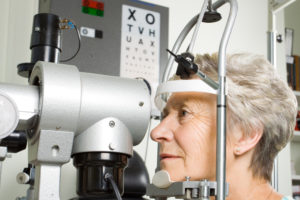Eye Exam May Diagnose Alzheimer’s Disease


Using a specialized, but non-invasive, eye scan of the retina, researchers are hopeful that there is a correlation between the retina and the brain in patients with Alzheimer’s disease.
Optical coherence tomography angiography (OCTA) allows scientists to see and evaluate the smallest blood vessels of the retina as well as the blood cells flowing through these tiny vessels.
Symptoms of Alzheimer’s Disease
Alzheimer’s causes dementia. Signs and symptoms of Alzheimer’s disease include impaired or difficulty with:
- Memory, e.g. remembering events
- Concentration, planning or problem-solving
- Finishing common/familiar tasks at home/work
- Knowing location or recognizing passage of time
- Visual or spatial relationships, i.e. getting lost, not understanding distance in driving, misplacing items
- Language, e.g. word finding, limited vocabulary
- Judgement in making decisions
Diagnosis of Alzheimer’s Disease
There is no single way to diagnose AD. Some tests are simple. Some tests, such as brain scans, are expensive. There is also no reliable way to screen or predict who is at risk for developing the disease.
Your doctor or a neurologist may use a multifaceted approach to making the diagnosis. Because so many other diseases can mimic Alzheimer’s, it is first important to rule out other causes of your symptoms, such as, stroke, Parkinson’s disease, depression or other medical conditions.
Presently, the diagnosis of this disease requires a multi-faceted approach to include:
- Physical exam
- Mental status testing
- Neuropsychological testing - evaluate memory and cognitive skills
- Interview with family - family or friends can assist in determining how you have changed over time
Additional Testing | Brain Scans
Additional testing may be needed if the diagnosis of the disease is inconclusive:
- Blood tests - there is no blood test of Alzheimer’s, but testing may be needed to rule out other diseases which can mimic the disease.
- Brain imaging tests: can not make the diagnosis solely on the results, but may help support the diagnosis of Alzheimer’s Disease and rule out other causes of your symptoms. Other conditions might include: bleeding, tumors or stroke
- Brain scans can include;
- MRI - magnetic resonance imaging
- CT - computerized tomography
- PET scan - positron emission tomography
New Retinal Scan | How it Works
Because the retina is connected to the brain, researchers believe they are able to correlate deterioration in the retina detected by OCTA with similar changes in the brain of Alzheimer’s patients.
Research has also shown that thinning of the retina correlates highly with shrinking of a part of the brain called the hippocampus seen in AD patients. Both these findings may indicate a person’s chance for developing Alzheimer’s disease even though the patient may not be exhibiting an symptoms.
Brain scans, though helpful in making the diagnosis of AD, are too expensive to function as a screening test.
It is hoped that the OCTA can be used as an inexpensive screening and diagnostic tool to allow earlier detection and possible treatments.


